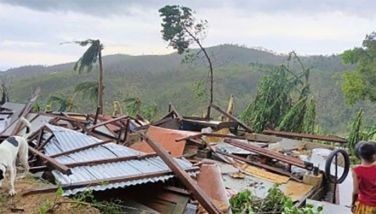Rising TB cases among soldiers alarm DOH
August 29, 2004 | 12:00am
The Department of Health (DOH) has expressed alarm over the rising cases of tuberculosis among members of the Armed Forces. In 2003, 833 soldiers tested positive for the respiratory illness.
"I am scared. We are worried the positivity rate (of TB) in the military is so big and (soldiers) are supposed to be fit," said Health Undersecretary Antonio Lopez during the 11th annual convention of the Philippine Coalition Against TB last Friday.
Lopez was reacting to the presentation of Lt. Col. Angelita Larin, the Armed Forces’ preventive medicine head, that a total of 833 soldiers were diagnosed with TB last year.
As such, the respiratory disease is now one of the top 10 leading causes of morbidity or sickness among military personnel.
Armed Forces records show that most of TB-stricken soldiers were in the Army with 469, followed by the Navy with 58, Air Force with 19, and wide support and separate units with 287.
From January to June this year, a total of 256 soldiers tested positive for tuberculosis, Larin added. The breakdown: Army with 104; Navy, 27; Air Force, 20; and wide support and separate units, 105.
Since Army soldiers are "very mobile" because of the nature of their duties, Larin said TB control has become a concern for the military.
Larin said the military learns about TB cases only through "passive surveillance" or when the ailing soldiers seek treatment.
Since the Armed Forces lacks trained personnel to handle TB cases, she said they are coordinating with agencies like the DOH to strengthen their anti-TB program.
Nationwide, the Armed Forces has 31 hospitals and 26 medical dispensaries but only 11 of them have Directly Observed Treatment Short Course (DOTS) which is recognized by the World Health Organization to treat TB.
Under DOTS, patients are required to undergo treatment for six months without interruption.
Lopez said the military should embark on a preventive approach to combat TB, ensuring that soldiers are following a healthy lifestyle.
"I am scared. We are worried the positivity rate (of TB) in the military is so big and (soldiers) are supposed to be fit," said Health Undersecretary Antonio Lopez during the 11th annual convention of the Philippine Coalition Against TB last Friday.
Lopez was reacting to the presentation of Lt. Col. Angelita Larin, the Armed Forces’ preventive medicine head, that a total of 833 soldiers were diagnosed with TB last year.
As such, the respiratory disease is now one of the top 10 leading causes of morbidity or sickness among military personnel.
Armed Forces records show that most of TB-stricken soldiers were in the Army with 469, followed by the Navy with 58, Air Force with 19, and wide support and separate units with 287.
From January to June this year, a total of 256 soldiers tested positive for tuberculosis, Larin added. The breakdown: Army with 104; Navy, 27; Air Force, 20; and wide support and separate units, 105.
Since Army soldiers are "very mobile" because of the nature of their duties, Larin said TB control has become a concern for the military.
Larin said the military learns about TB cases only through "passive surveillance" or when the ailing soldiers seek treatment.
Since the Armed Forces lacks trained personnel to handle TB cases, she said they are coordinating with agencies like the DOH to strengthen their anti-TB program.
Nationwide, the Armed Forces has 31 hospitals and 26 medical dispensaries but only 11 of them have Directly Observed Treatment Short Course (DOTS) which is recognized by the World Health Organization to treat TB.
Under DOTS, patients are required to undergo treatment for six months without interruption.
Lopez said the military should embark on a preventive approach to combat TB, ensuring that soldiers are following a healthy lifestyle.
BrandSpace Articles
<
>
- Latest
- Trending
Trending
Latest
Trending
Latest
Recommended



























